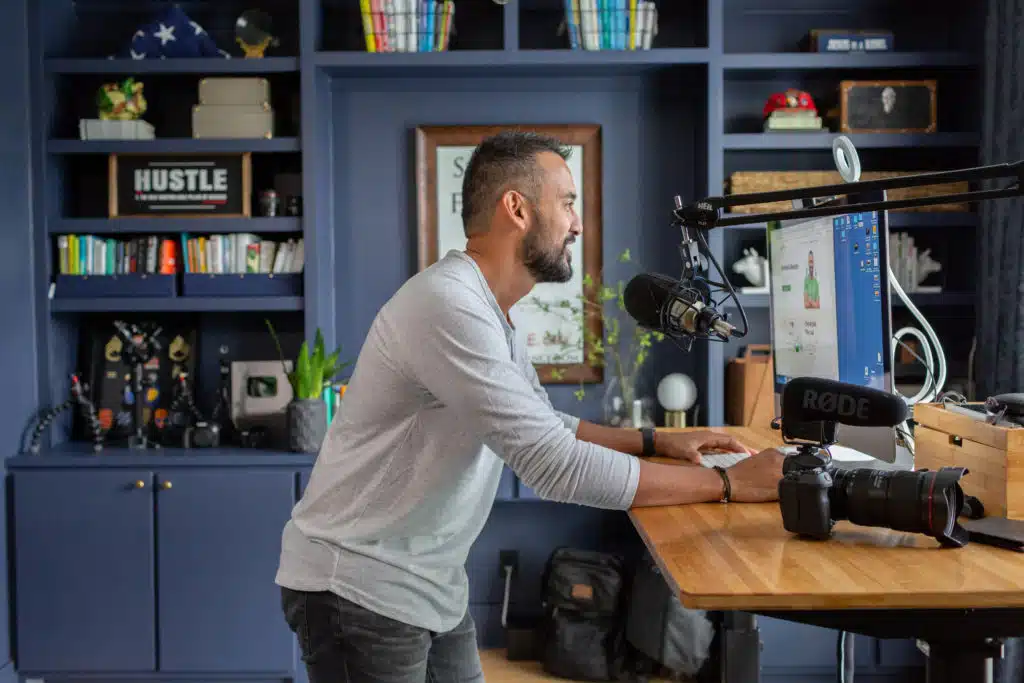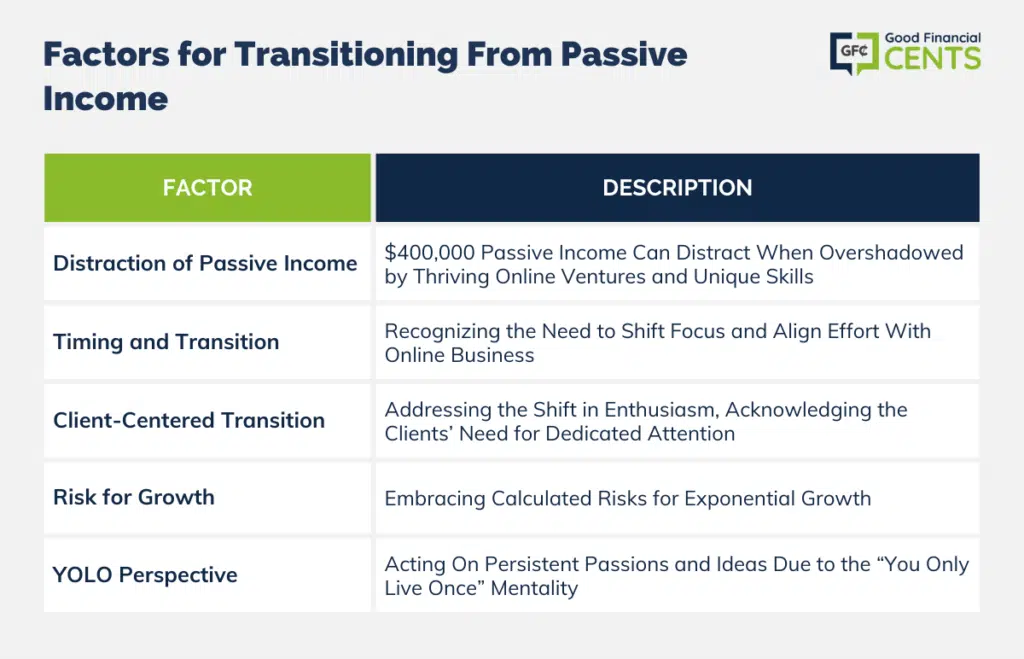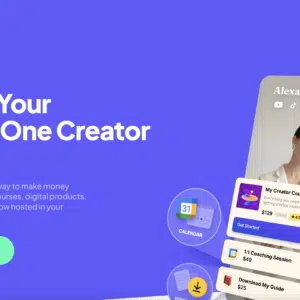Imagine making over $400,000 a year, and you don’t even have to get out of bed. But then one day you decide to give it up – to give it all away.
Why in the world would anybody do that?
But that’s exactly what I did with my financial planning practice. I poured my entire career, over 16 years, into building a business that was making me well over $400,000 a year.
If that wasn’t enough, I was the boss, I didn’t have to commute to work, and I had a dedicated team that was taking care of 95% of the day-to-day operations. It was literally a dream come true!
And yet, I walked away.
There are important lessons I’ve learned from this experience, and I hope you’ll learn a few as well.
Table of Contents
- Saying Goodbye to the Perfect Passive Business
- My Thought Process on Selling My “Career Baby”
- 1. The $400,000 Passive Income Business Was a Distraction
- 2. It Was Time
- 3. My Financial Planning Practice Clients Deserved Better
- 4. Big Risks = Exponential Growth
- 5. YOLO (You Only Live Once) – Remembering That Life Is Too Short
- No Regrets After Making the Tough Choice
- Final Thoughts – Why I Gave Up $400,000 of Passive Income
Saying Goodbye to the Perfect Passive Business
So many people chase passive incomes, and I had this financial planning practice set up to be just that. I had it structured to be the closest thing to passive income possible with a brick-and-mortar business, and it was bringing in over $400,000 a year in recurring revenue.
Was I crazy for giving this thing up? Some would say yes.
But what I want to share in this article is what my reasoning was, my rationale for giving up truly a passive income source. After all, isn’t that what millions of people are trying to have?
I want to share my thought process in this article in case you may be facing a similar decision.
It’s not an uncommon position to be in. If you’re employed, you may be agonizing over whether or not to take a new job or even move into a whole new career.
If you’re an entrepreneur, you may be struggling with the decision to cut off one income source in favor of adding another.
What makes it such a tough decision is that you’re voluntarily giving up an income source. That’s almost the very definition of insanity. After all, isn’t adding additional income sources the goal for millions of people?
This was not an easy decision, and not just from the monetary aspect. This was my career. It was something I had spent over 16 years growing. My financial planning practice was my baby, even my first baby. I started this before I had my first son. For me to walk away – to give it up – was incredibly difficult.
It was a ton of prayer, asking God to let me know if this was the right decision.
Read below to find out more about my journey, or you can check out the audio on the Good Financial Cents podcast here:
My Thought Process on Selling My “Career Baby”
If you’ve ever built a business from the ground up and enjoyed good success with it, then you know it can be emotionally hard to let go of. But when I moved from Illinois to the Nashville area, I knew it was time for a change. It wasn’t just the geographic move either.
I was developing other income sources that were forcing me to choose where to spend the majority of my time and creative juices.
My first attempt was a partial sale. That was something I tried before we even moved to Nashville. That was followed by an attempted sale to my former partner, which he initially declined.
These early failures at selling the practice didn’t zap the idea from my mind. But since it was a difficult decision from the start, it did make an already complicated process, well, more complicated.
And when things get more complicated, that’s when second-guessing enters the picture. Once again, I began asking myself, Is this really the right thing? Is this the best move?
It finally got to a point where I recognized that, yes, this is what I needed to do. And even though I knew it, it still wasn’t easy.
So, what was my final reasoning? What was my final rationale for getting rid of this business? There are several reasons, which I’ll break down below.
1. The $400,000 Passive Income Business Was a Distraction
That’s definitely weird to say – totally weird. How could making $400,000 a year passively be a distraction?
You have to realize that while I’m running this business, even though I’m running it remotely, I also have my online business. And that was thriving.
My online business included Good Financial Cents, my YouTube channel, and brand deals I was doing, as well as sponsorship-type deals. I also had a mastermind group that people were paying to be a part of.
There are a lot of other things going on. And that’s where the brick-and-mortar business that I spent 16+ years growing became a distraction.
You see, not only were the online business ventures earning me a lot of money, but I really enjoyed doing them. They were tapping into what I referred to as my unique ability.
A lot of people spend their entire lives trying to find their unique abilities. Once you find it, it’s a real game-changer. That’s the point I was at. It was the stuff I was making a ton of money at and just thriving at, enjoying every single minute of doing it.
But I no longer had that passion for the financial planning practice, and that’s how it became a distraction.
An Example of the Distractions I Was Dealing With
One day, I was in the middle of recording a video for an online business, and I got a call that a client had an issue with a check. It was about a $500 check she wanted to deposit into her checking account. That was an issue my office manager could have easily handled. My client didn’t need me to take care of this, but it was what she was accustomed to.
If you get creative and create something – whether you’re working on a project, a video, a podcast, writing a book, or whatever that is – you know that when you get interrupted, it’s hard to pick back up where you left off.
Maybe you’re wired differently, but that’s how my brain is wired. I can just remember going to my wife and saying, I know it’s not a big deal, but it just totally derailed me. And my wife at that time finally said, “Wow, I get it, it’s time. It’s time to move on”. I was blown away, maybe because I knew deep inside that she was completely right.
Then There’s the Opportunity Cost
Another aspect of the distraction factor was financial. Yes, my brick-and-mortar financial planning practice was humming along, almost passively. But my online ventures were bringing in about three times more revenue than the financial planning practice was. It took a lot of effort and concentration to make that happen.
This might be a better example of a good problem. Yes, I had the financial planning business up and running, largely on automatic pilot. But my online business was humming – the bigger, better long-term play, you might say. I couldn’t keep having to stop my day to work on a business that was bringing in so much less.
That was really the big epiphany for me. I knew it was time to walk away so I could pour 100% of my focus into the online business.
That brings us to Reason Number 2…
2. It Was Time

Simply put, it was time to move on. It was time to start focusing on putting more effort into what I was doing online. I enjoy creating content and writing blog posts. I enjoy publishing YouTube videos and podcasts.
And at the end of the day, I knew I was putting out information online that would help people. Hundreds, thousands, maybe even millions of people – I don’t know.
I moved to the Nashville area where I live super close to Dave Ramsey and his brand-new office. Love him or hate him, he has impacted millions of people with his radio show, his book, and all his different programs.
I had similar ambitions of wanting to help as many people as I could. And to also make really good money and take care of my family while I’m helping others. That’s such an amazing gift that you can’t really fully comprehend it.
Either way, though, it was time to start focusing more of my online efforts. I knew that once I totally walked away from the financial planning practice and could focus entirely on the online business, I had the potential to make more, but I also knew that I was going to enjoy it that much more.
Now, did I know this for sure? Heck, no, I didn’t. This was all a pure act of faith, hoping for a positive outcome. But based on my prior experience, I just knew that it was time.
You see, I’m no stranger to taking risks, which is a big part of finding and moving toward those better opportunities. But more on that in a little bit.
3. My Financial Planning Practice Clients Deserved Better
They did. They deserved better. And what I mean by that is obviously my heart wasn’t in it anymore. I had an amazing staff and an amazing office manager. I had a junior advisor who was taking care of my people, but they still deserved better.
When I started in the business, I was so excited to help people. I was so excited about building the financial plans, talking about investment portfolios, rebalancing and reallocating, and required minimum distributions and 529 college savings plans. I was in it to win, and to help my clients win it at the same time.
But it got to the point where I just didn’t have the heart. I knew my clients deserved to work with somebody who was completely in it, and I wasn’t – not anymore. My clients weren’t getting 100% of me. They were getting 80%, 70%, or whatever – it just depended on whatever was going on with my online business or with my family.
That was a hard one to accept because I had so much pride in how much time and effort I put into each client, just building the relationships and genuinely caring about who they were, what they were doing, the concerns they had, the fears they have… that was me. I would wear all my client’s emotions.
When we had bad markets, I saw how that would affect people, and it affected me, too. But when I didn’t have that same passion, that same drive, and that same desire, I knew I needed to find somebody who was going to take better care of my clients than I had the capacity to. It was a hard one to accept and a hard one to admit, but my clients did deserve better than what I was giving them.
4. Big Risks = Exponential Growth
I had prior experience with this principle. It isn’t just a tweetable quote, either. In different aspects of my business life, there was often a big payoff when I was willing or able to take a big risk.
One example I can remember was when I left my first employer. I left after five years and co-founded my own investment planning firm.
That was a huge risk, and it was scary!
I had a lot of people tell me it was a bad decision. Even a former mentor of mine told me I was making the biggest mistake of my life. That was hard to hear.
| But 90 days after making the “biggest mistake of my life,” I was making three times as much per month. In just 90 days – and it didn’t stop there. |
That big risk brought exponential growth.
On the next go-round, I founded my own wealth management firm. Basically, I left this firm and founded my own wealth management firm, Alliance Wealth Management. It was an RIA (Registered Investment Advisor).
That was another huge risk. I didn’t know if my clients were going to come over with me. I didn’t know what people were going to think.
There was also a monetary risk because that move took a lot of money to get off the ground. But once again, the big risk produced exponential growth.
Moving to Nashville Was Another Huge Risk
I’ve lived on the West Coast (L.A.), but my wife, on the other hand, had never lived anywhere else but Illinois. Neither had my family. Moving 3 ½ hours away from everything we knew as a family – including my business – was another huge risk. But it also brought exponential growth.
Does that necessarily mean every time you take a big risk, it’s always going to work out? Of course not.
I share a deeper dive into this concept on my YouTube channel here:
Sometimes Taking Big Risks Doesn’t = Exponential Growth
I’ve had several different instances in my life where taking a risk didn’t quite work out the way I thought or hoped it would. Translated, I can’t say I knew without a doubt that ditching the financial planning practice was going to work. After all, nothing is ever completely certain.
By risk, I don’t mean I’m going to do something blindfolded, cross my fingers, and hope it all works out.
No, these were all calculated risks. These were risks that I took because I had mentors seeking counsel from other people before me so that I had the wisdom, experience, and knowledge before I did these things.
I guess you could say there was less risk for me in selling the practice due to the fact that I was no stranger to risk-taking.
Knowing that and looking back at these different situations in my life where I took a big risk, the payoff was there. That is, as long as it wasn’t a risk where I didn’t talk to anybody and I just acted on impulse – that’s completely different. No, all the risks I’d taken above were big, calculated risks.
For example, we didn’t decide to move to Nashville one day and move the next day; it was a year-long process. Founding my own investment firm was, I think, at least a year-long process. And leaving my first firm was something like a six- to nine-month process. But they all led to exponential growth.
5. YOLO (You Only Live Once) – Remembering That Life Is Too Short
This is the final reason, and it’s one that has multiple parts.
I love this quote by Paulo Coelho:
“If it’s still in your mind, it’s still worth taking the risk.”
That is such insightful wisdom because when I get an idea, I want to do it immediately. I’m so impulsive; that’s just how I’m wired. But things don’t always play out that way. I’ve learned that I’ve got to tap on the breaks, hit pause, and really think through what a big move looks like.
But the things that I just keep thinking about, and keep thinking about, and keep thinking about – when it’s still there – that means there’s something there. There’s a passion, there’s a desire, and chances are you’re willing to do whatever it takes to make sure that whatever that idea succeeds. That’s definitely me.
So, with me selling the business – walking away from this cash cow that I had invested 16 years in – it was a thought that would not leave my mind. I knew I had to start focusing on the online business first.
I knew it.
And so after a year, a couple of years of finally distancing myself from the practice, moving three hours away, and then talking to other people who have sold their businesses and talking to different suitors – even when the first deal fell through, then the second deal fell through, I’m like, gosh, I can’t find anybody who’s willing to buy it that I think is going to take care of my clients.
And then finally, I found the perfect buyer. I mean, it was actually right in front of me the entire time. It was right there! And that’s when I knew it was time to move on.
The Calculated Risk Angle
Now, just a couple of other tidbits that I want to share on the calculated risk front:
- It held over 12 months in living expenses when this happened, so we had a nice cushion. That definitely lowered the risk.
- The sale was structured so that I would continue to get paid a monthly check. The payment is over a seven-year period or longer, depending on whether we hit whatever the purchase price was, which is the agreed-upon price. If it pays off in seven years, great. If what I have received over that seven-year period does not match the amount we agreed on, then it goes up that much more.
- We had a contingency plan. If selling the practice didn’t work out, if the online business didn’t work out, if I got hit with another Google algorithm update, and the online business vanished, then what? We had a contingency plan for all that.
Considering all these different obstacles I’ve had to overcome, I was pretty confident that I could either take a day job as a junior advisor again or I could go into sales. Either way, I could figure something out.
With the contingency plan – the big emergency fund– I’m still getting paid, and having a CYA plan, I felt pretty confident it was time to sell the practice.
But I hope you can see that this was still not an easy decision. The financial planning practice brought in a lot of money, and it was my baby. I just had so much of my identity tied up in my business that it was hard to walk away.
But I walked away, I did.

No Regrets After Making the Tough Choice
Yep, I’m glad I did, especially now that it’s a done deal. I haven’t lost any sleep over selling the business, either. It’s been really, really, really good – even awesome! And I hope that what I’ve shared with you here is helpful.
If you’re like me, a time will come when you’ll need to make a tough decision to walk away from something that’s important to you. It’s hard, but it helps to remember there are just so many good things and so much potential when you strongly believe it’s time to make a major change.
I would have you look at what you need from the thing that you’re working on right now versus what you need from whatever the new idea is. Whatever it is that you can’t get out of your mind, define what you need from it for it to be a success. Then do what you need to do to make it a calculated risk, not a plunge into the dark, and make it your new reality.
Final Thoughts – Why I Gave Up $400,000 of Passive Income
My decision to give up $400,000 of passive income from my financial planning practice was rooted in several key factors. I recognized that it had become a distraction from my true passion and abilities in my thriving online ventures. The calculated risks I have taken throughout my career have shown me that big risks often lead to exponential growth.
Moreover, I realized that life is too short to hold onto something that no longer aligns with my heart and ambitions. This decision has proven to be the right one, reinforcing the importance of aligning passion, purpose, and calculated risks in pursuit of growth and fulfillment.








What a scam. You should be ashamed.
I should be ashamed for growing a business for 16 years and then selling it? Haha….